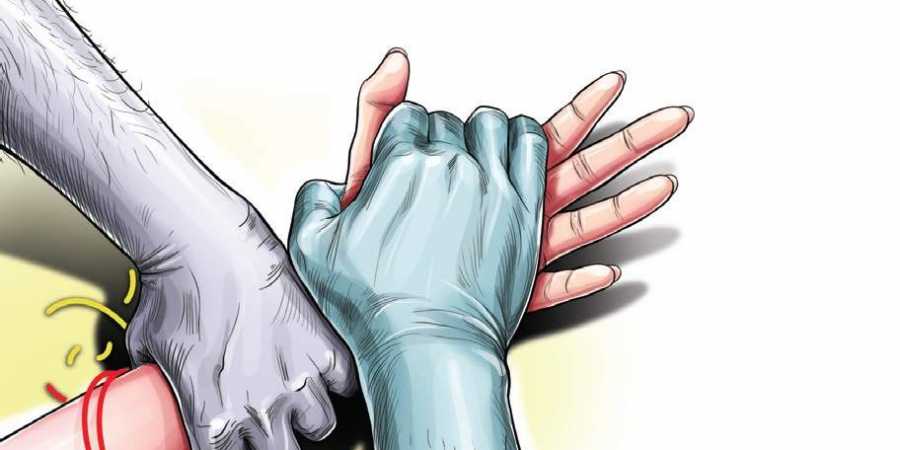The incessant and horrific incidences of rape and sexual assault, especially of minor girls, have presented a gloomy picture of the state of legal helplessness in the Northern states of Nigeria, in particular and the country at large.
Nowhere is most hit by this phenomenon than the Muslim populated states with entrenched Islamic criminal law regime.
Bauchi: Rapists on rampage as 14-year-old gang-raped for one month
Most women here were raped, every man here was beaten, Jibia IDPs say
For instance, in the first six months of 2020, Sokoto State Hisbah Commission recorded 155 rape cases.
The most horrific side of this problem is that children are rampantly falling prey for these rapists.
The 2014 case of a teenage girl who was infected with HIV by a 63-year-old man, Ubale Saidu Dutsa will forever remain indelible in our memory.
This is about the only case of rape where the culprit was convicted by an Upper Sharia court in the whole Northern states.
The court recorded this feat because the culprit volunteered a confession.
It is therefore very convenient for state prosecutors to prosecute the culprit before the English-styled High Court in all the states of Northern Nigeria.
The recent conviction of Usman Shehu Bashir to death by hanging for raping to death of a two-year-old girl by a Kaduna State High Court was actually charged under culpable homicide punishable with death under Section 221 of the Kaduna State Penal Code.
The public appears disenchanted with the existing penalty, as the more rape is being punished the more people commit the offence.
This prompted some activists like International Federation of Women Lawyers (FIDA) to advocate stiffer punishment for rapists in Nigeria.
Even senior lawyers and some members of the National Assembly are supporting stiffer punishment like penile amputation.
Ironically, the Sharia Courts, notorious for awarding stiffer penalties, are being avoided by agents of state like plague.
One begins to wonder what could have been responsible for this state of affairs.
How will a state avoids the Sharīʿia system it worked tirelessly to nurture and entrench amidst international condemnation, and continue to patronise the English-styled court despite the public discontent towards the sentences it passes?
The reason for this state of affairs is not farfetched.
A rape victim (prosecutrix) before the Sharia court is required to produce four unimpeachable witnesses similar to those required for zina (consensual sex); this volume of witnesses is difficult to come by even in consensual sex.
If the prosecutrix is unable to produce the required number of witnesses she risks being penalised by the State for qadhf, in addition to what she suffered from her tormentor.
Placing such an onerous burden on a child victim of sexual assault is even more worrisome.
It is against this backdrop that the existing legal regime is examined with a view to ascertaining whether a paradigmatic shift is possible for the Sharīʿia perspective, for the regime to serve more of a sword than a shield for the predator who pounced on innocent souls to satisfy their sexual urge or superstitious beliefs.
Nowadays, the seemingly normal people, motivated by quest for material gains, are the perpetrators of this horrible act of child sexual assault. Moreover, the scourge of HIV/AIDS has added another dimension to this problem.
There is belief common in South Africa called ‘virgin cleansing myth’ or ‘HIV/AIDS virgin cure’ that sexual intercourse with minor girls as young as nine months old can cure HIV/AIDS.
The victims, mostly female infants in the range of five months to 11 years, are subjected not only to physical injury but may also be infected with terminal disease of HIV/AIDS in the name of tradition.
Research has shown that women, particularly young girls, subjected to sexual violence, are more vulnerable to contacting HIV/AIDS owing to risk of tearing in the course of the attack.
The impact of the violence is more on minor girls because of their immaturity. Such horrible beliefs might have influenced the likes of Ubale Saidu Dutsa to engage in such condemnable and nefarious practice.
It shall be argued that as long as rape and zina are treated as though of the same genre in terms of evidential burden, culprits will always get away with their delict.
The victims, on the other hand, would mostly choose the path of concealment to avoid double suffering, i.e., sexual violence and penalty for qadhf.
The term igtisāb is derived from gaṣb, which refers to seizing someone else’s property wrongfully by force, and goes beyond land and other tangible items to include transgression against the honour and dignity.
Usually in gaṣb, the item forcibly seized is returned to the owner and compensation is ordered if it is lost or destroyed.
In the same token, igtisāb which is transgressing the honour of a woman by having forcible sex with her entitles her to claim monetary compensation.
It is necessary to stress from the outset that Nigerian Muslims adhere to the Maliki School and all the Sharia Penal Codes adopt its principles.
This School places more emphasis on sexual act, giving little or no weight to other adjoining acts, such as threat, act of violence and coercion against the victim that make the sexual intercourse possible.
It is provided in such a way that once sexual activity is established to have taken place against the will of the female victim, the culprit is regarded as having committed zina on his own part.
His victim is however left free and unpunished for the act was not wilful on her own part.
In addition to the criminal penalty, a civil element of payment of dower of her equal is also added.
To entitle a rape victim to compensation, she must adduce evidence which Ibn al-Qāsim put as four reliable witnesses.
Ibn al-Qāsim’s view as reported by Asbagu and Suhnūn suggests that rape is like zina, thus establishing it requires four male witnesses, failing which no punishment is inflicted on the perpetrator.
The same burden of proof is required to enable her receive monetary compensation, i.e., ṣadāq al-mithli, or at least her oath plus the testimonies of two witnesses; even then, no hadd will be meted on him.
Interestingly, it is position of Ibn al-Qāsim that has been adopted hook, line and sinker and incorporated into the Sharia penal codes of the 11 states in Northern Nigeria.
For instance, to clear any doubt on proof of zina and rape the explanatory note to the Kano State Sharia Penal Code (KSSPC) is apposite and hence reproduced for emphasis.
“The conditions for proving the offences of zina (fornication or adultery) or rape in respect of a married person are as follows: (a) Islam; (b) maturity; (c) sanity; (d) liberty; (e) valid marriage; (f) consummation of the marriage; (g) four witnesses; or (h) confession.
“If any of the above conditions has not been proved by the person alleging zina or rape there is no punishment of stoning to death.”
Of course, not all the Maliki jurists are with him on this.
Other jurists accept other means of proof like evidence that he eloped with her for a period that sexual intercourse is possible, and the lady claimed he had sex with her, and that will entitle her to ṣadāq al-mithli.
The implication of treating rape as a subset of zina as evident from the explanatory note of Kano State Sharia Penal Code cited has enormous consequences on rape victims and the society at large.
It would simply mean that the court will seek high evidential requirement of four reliable witnesses from the rape victim, and such high evidential requirement is practically impossible even in consensual sexual intercourse.
Being a forcible act, rape is hardly committed where people can witness it.
Therefore, if four witnesses are required for rape it is very easy for culprits to get away with it by simple refusal to admit.
Unfortunately, this position has received legal certification in the Sudanese case of Sudan Government v. Al-Sir Muhammad al-Sanussi, SC/CC/5/87.
(To be continued)
Prof. Abubakar wrote from Abuja [email protected]

 Join Daily Trust WhatsApp Community For Quick Access To News and Happenings Around You.
Join Daily Trust WhatsApp Community For Quick Access To News and Happenings Around You.

